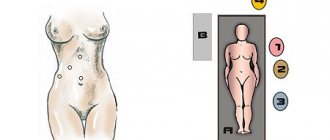Why does schizophrenia worsen in the spring?
There are several reasons why mental illnesses worsen in the spring. By the end of winter, people's body's defenses weaken and there are not enough vitamins in it. Some processes begin to accelerate sharply, requiring more nutrients that are already insufficient. Solar activity increases the sensitivity of the nervous system, which can lead to disruptions in the hormonal system.
In addition, an increase in daylight hours, changes in weather, changes in temperature and atmospheric pressure also have a great impact on the patient’s condition.
A risk factor for exacerbation can be severe stress and mental stress.
What causes exacerbations in schizophrenia?
Often, severe stress or nervous tension can become a catalyst for an acute attack of schizophrenia. The reasons are different - problems in relationships between women and men or vice versa, difficulties in the family, at work, and so on. Misunderstandings and quarrels accumulate over time and result in such a sad outcome.
Bad habits. Just one dose of some drugs can provoke the acute stage of schizophrenia. Alcohol does not act as quickly, but with regular use it also very often leads to psychosis.
Hormonal changes. Pregnancy, childbirth, lactation, puberty, menopause in women - unfortunately, all these conditions often coexist with periods of exacerbation in people with schizophrenia. This is what most often becomes the cause of tragic episodes when mothers are thrown out of windows with their small children and other similar criminal situations.
Seasonality. In autumn and spring, schizophrenia worsens, and at this time it is especially difficult for people with pathologies of consciousness.
Symptoms and signs of exacerbation of schizophrenia
Schizophrenia manifests itself with various signs, but there are a number of specific symptoms that are characteristic of this mental illness:
- Auditory hallucinations At the same time, patients refuse to confirm this fact. Voices arise in a person's head and can manifest themselves in different ways. In some cases, the voice can comment on what is happening to a person or simply communicate with him. However, such auditory hallucinations can prompt the patient to take some aggressive actions, which can cause harm to himself or others.
- Avoidance of communication When hallucinations occur, a person begins to avoid communication, tries to isolate himself, may start laughing for no reason, looks around, listens.
- Visual hallucinations Sometimes symptoms manifest themselves as tactile and visual hallucinations, so any changes in the patient’s behavior should be a signal for his examination.
- Delusional ideas A distinctive feature of such obsessive thoughts is that it is impossible to convince a person of them or force them to look at them differently. He will try to select new arguments, often absurd. Moreover, ideas are often religious or cosmic in nature. For example, a patient may talk about aliens who are chasing him.
- Increased irritability A person may lose interest in what he was very interested in before. In addition, it becomes difficult for the patient to carry out hygiene procedures, as a result of which he stops taking care of his appearance, becomes unkempt and sloppy.
- Increased activity Sudden movements, increased facial expressions, and antics become the markers by which an aggravated disease can be determined.
- “Disrupted thinking” consists in the fact that a person quickly changes the topic of conversation or, conversely, repeats the same thought many times in a row. Sometimes patients come up with new words, calling them ordinary objects.
Autumn is a time of exacerbation of mental disorders. How to protect yourself
Autumn has come, and at the same time, an unimportant, depressed mood, blues, you don’t want to do anything, you don’t want to see anyone. What is this, a disease? And how to defeat her? Senior doctor of the Almaty Mental Health Center, honorary professor, excellent student of health care of the USSR and the Republic of Kazakhstan Kulyan Abdulgalimovna Adilkhanova talks about this and other forms of depression.
— Kulyan Abdulgalimovna, what mental illnesses are especially aggravated in the fall?
— These are so-called endogenous diseases, they are most often hereditary and worsen in spring and autumn, especially depression, which is why we call it seasonal depression. And depression is not necessarily a mental illness. Now, according to WHO, every eighth person on earth suffers from depression and experiences at least one depressive episode. Why? Because various economic, environmental conditions and factors, climate fluctuations influence the exacerbation of these diseases and contribute to a stressful situation. Therefore, the main group of our patients are the so-called endogenous patients and this category of diseases includes schizophrenia. We can say that the bulk of our patients are patients with schizophrenia.
Unfortunately, many patients do not immediately turn to doctors, but first go to some healers, to a mullah, to healers, to some acquaintances, and when all this does not help them in any way, they come to us. My young colleagues call me and say, here, a primary patient has arrived, but he is no longer fresh. This means that he had already tried to be treated by some healers, but his illness had progressed, and it is much more difficult to treat such patients. People should know that patients with schizophrenia are registered patients, they should be under the supervision of psychiatrists on an outpatient basis. They receive the course of treatment in a hospital, and receive further supportive treatment on an outpatient basis. Of course, seasonality greatly affects such patients.
The second group of diseases is the so-called affective psychoses. They are associated with changes in mood, when a person is either upbeat or, conversely, depressed. These are also, as a rule, seasonal patients and their exacerbations are also seasonal. Let's say that excitement most often occurs in the spring, and depression in the fall. I'm not even talking about the childhood disease autism, this is a separate topic.
Also one of the big problems in psychiatry is Alzheimer's disease. Alzheimer's disease is a unique form of dementia in older people; for example, US President Ronald Reagan suffered from it. When friends and colleagues came to one of his birthdays, he forgot that he was the President of the United States. And this disease is also relevant now, this is due to the aging of the population around the world.
— Is the number of mentally ill people increasing?
- Unfortunately, it is increasing. Diagnoses are very different. Endogenous, affective psychoses, patients with epilepsy... Some of them are observed here, some by neurologists. There are also a lot of patients with borderline pathology, these include those who suffer from various neuroses, panic disorders or social phobias. There are a lot of patients with organic diseases, such as Alzheimer's disease and other atrophic diseases. After all, over time, a person ages, which means the brain gets older, and atrophy occurs. Atrophic diseases lead to personality changes.
— Can you talk about depression in more detail, because you said that this disease will soon become the disease of the century.
- Yes. It is expected that by the middle of the 21st century this disease will take first place, leaving behind cardiovascular and other diseases. Depression can be mild when, due to some stressful situation, some mental trauma, a person’s mood changes, he becomes depressed, sad, gloomy... That is, it is anxious depression. Just recently I had a young woman at my appointment, she is a model, she was depressed and panicked. And this happened because she recently divorced her husband, and he won a lawsuit for all property, for all real estate. And she was left with three children and nothing. Against this background, she became depressed.
In general, depression is a diverse disease; not all depressed patients are considered mentally ill, and we do not take such people into account. There are situational depressions and reactive depressions. Reactive depressions usually occur against the background of some kind of natural disaster, for example, an earthquake, flood, or hurricane. And this is understandable. After all, if people lose their property, their loved ones, their homes, then they will not have an elevated mood, complacency, this is a human reaction to various unfavorable, negative situations. There are depressions that, as we say, arise spontaneously. This form of depression is hereditary depression. These are severe forms of depression and we definitely take such patients into account.
- What are the dangers of depression?
— Depression is dangerous, first of all, due to attempts at suicide. The fact that depression is caused by various negative situations in moral, psychological, financial, economic, environmental and so on speaks volumes. Not everyone can cope with such a load, not everyone is ready for it, and first of all internally, which is why there are difficult outcomes, even tragic ones. A person may lose heart, commit suicide due to loss of a job, loss of a loved one, friend, parents, apartment, trust, and so on.
- So what should you do to avoid losing heart and going into depression?
“The main thing is to contact a specialist in a timely manner, get good psychotherapeutic professional help, and not run around for some reason.” We always warn people about this. Just yesterday we looked at a patient in the maternity hospital, she developed psychosis after giving birth, we began to find out the reasons. It turns out that her husband always beat her, humiliated her, kicked her out of the house, she often lost consciousness, and she hid this from her mother and from her loved ones. And we say that she needs to be treated, and she says, my grandmother, who raised her, told me that I need to go to the village and get treatment from a mullah.
Most often, it happens that what is needed is not so much medication as psychotherapeutic help. Psychotherapists and psychologists will help a person find peace of mind, they will clearly explain why this is happening to him, that this condition is temporary, it will pass, the main thing is to find the strength to survive it with dignity, without harm to yourself and the loved ones around you. If depression is severe and prolonged, we sometimes give them additional antidepressants.
— Can a person who has fallen into depression cope with his condition on his own?
— In principle, it can, but it will depend on the character of the person, on his education, intelligence, spirituality. There are people who are very vulnerable, impressionable, emotionally unstable, it’s harder for them, they need the help of specialists and the support of loved ones. And there are strong-willed people who courageously endure all hardships and blows of fate. Not indifferently, calmly, but courageously.
I would especially like to say about the beautiful half of humanity. I would advise girls and women to practice more self-approval. It happens that a woman buys something for herself and begins to ooh and ahh, why did I buy it, it’s expensive, maybe I should return it, and so on. Don't think like that. On the contrary, you have to say, oh, what a great fellow I am, that I made a successful purchase, successfully performed somewhere, successfully went somewhere. That is, there should always be a feeling of self-approval, self-praise, and not self-flagellation. Such things are a good prevention of depression. That is, you need to learn to look positively at yourself, at the world and at those around you. And, of course, you need to be kinder, more tolerant of people, treat relatives, neighbors, colleagues, and friends kindly. You should never envy anyone, lie, dodge, get angry, be offended, and then you will not have depression, you will always have a strong inner state.
- That is, as Carnegie said, a person gets sick not from what he eats, but from what eats him...
- Absolutely right. Strive to see only the good in everything. In the end, do some general cleaning in the house, by the way, it helps a lot, go to the bathhouse, visit relatives, to a concert, to a museum, to some useful lectures on improving the soul... The main thing is not to withdraw into yourself and not hide with your head under the blanket. This makes me even more sad. Join some gyms, it also helps a lot, go swimming, do aerobics. And you will see how your life will shine, even on a cloudy autumn day...
—Are such patients dangerous to others?
— Patients with mild depression are not dangerous. And those with a severe mental form are to some extent dangerous. I once observed depression in a patient who had severe anxiety. She worked as the head of a kindergarten, and believed that life on earth was ending, the earth was collapsing and that she was guilty before everyone, that she needed to be saved, and for this she needed to kill herself and not only herself, but also her only, young son, so that he didn’t suffer, and she did it, killed him. This is a severe mental form of depression, when patients have the idea of self-flagellation, a feeling of guilt before relatives, before society, and such patients, of course, are dangerous both in relation to themselves and in relation to others.
Unfortunately, many people suffering from depression are embarrassed to go to psychologists and psychotherapists, they consider it shameful, they are afraid that someone will find out about it, and they hide their mental illnesses. People often turn to me and say, we are ashamed to go to your center, could you take a look at home? But I never see them at home; such patients should only be seen in specialized medical institutions. They say, what if I meet some acquaintances or someone finds out that I was treated by you. I say, no one will ever learn from us, we never give such information to society, we do not make it public. Therefore, it is necessary to carry out a lot of educational work among the population, to explain that they should not be afraid to go to doctors. After all, no one is immune from mental disorder or any other disease. No one is embarrassed when they have a headache or their blood pressure rises, they run to doctors, but they are embarrassed to see psychiatrists. You know, in foreign countries every family tries to have its own family psychotherapist. And there is nothing to be ashamed of here. And we are still afraid. In our practice, there was a case when one young woman’s husband began to tell her that she had become fat, unattractive and had the blues, she began taking Chinese diet pills, lost a lot of weight, and now she couldn’t gain weight and was generally depressed. But initially she should have consulted doctors, and there would have been no such consequences, either physical or psychological.
— Is it possible to receive treatment anonymously?
- No. We accept you only if you have an ID card, it must be there. If the patient has a serious mental illness, everything should be official. This is clear.
— Is it possible to determine from a person’s appearance, for example, on the street, in a hallway, at work, that he is mentally ill?
- It is usually noticeable if a person behaves unusually, inappropriately, if he is excited, uncontrollable, and so on. You can distinguish, for example, a drunk person, and in the same way, mental illnesses have their own external manifestations.
Torgyn Nurseitova
How to cope with autumn depression: 5 ways to brighten up gray everyday life
White day frowned;
The rains poured incessantly;
They moved in with people as neighbors
Longing and sleep, melancholy and laziness.
Alexey Koltsov
Autumn. The streets are gray, the city seems to have been covered by a shroud, the colors have faded. Cold, rain and mud. The darkness falls earlier and earlier, and you want to wrap yourself in a blanket and fall asleep. Even memories of a sunny and warm summer do not warm you up - they only bring irritation and increase depression... If all this is familiar to you, if the smile has long left your face, and the mischievous sparkle has disappeared from your eyes, you are sick. And you urgently need to be treated for this terrible disease: autumn depression.
1. The right morning
Start fighting autumn depression thoroughly and in the very first hours after waking up. What can cheer you up? First, a cup of aromatic coffee - but not from your ordinary cup. Buy yourself a special, fun mug. Let it be bright, ridiculous or even funny. Well, did you smile? If not, we continue treatment. Let's get started with water treatments! A morning shower will not only help you wake up and get yourself in order after sleep, but will also give you a boost of positive emotions even on the gloomiest day. It is important to choose the right shower gel. A product with the aroma of lime, lemon and grapefruit is perfect for these purposes. To enhance the effect, add a couple of drops of essential oil - such as orange or bergamot. Yes! And change your regular towels in the bathroom to yellow or orange ones. These colors will fill the room with the warmth of the sun and help lift your mood.
2. Defeat the blues from the inside
A well-designed menu for the whole day will not only not harm your figure, but will also help you get rid of stress and bad mood. Would you say this is impossible? In fact, scientists have long proven that there are a number of food products, the consumption of which increases the level of endorphins in the body significantly. So, the menu for one day to combat depression: Breakfast. Start your day with a bowl of hot oatmeal with cinnamon and banana. Add a couple of slices of your favorite cheese. This will not only allow you to forget about hunger for a long time, but will also improve your mood due to the production of joy hormones. Lunch. Before lunch, it is advisable to eat natural yogurt and drink green tea. If you really want something sweet, treat yourself to high-quality dark chocolate. Remember, it is best to choose chocolate with a cocoa content of 65% or higher. Such a snack will not only have a beneficial effect on the functioning of the stomach, but will also strengthen the nervous system and nourish blood vessels. Dinner. Choose a good cut of red meat and be sure to supplement your diet with green vegetables. Broccoli is ideal for this. It’s not for nothing that it is called the most “positive” vegetable. Don't forget about onions and garlic: these vegetables will strengthen your immune system and become faithful allies in the fight against bad mood. Sea kale is perfect as a salad, and for dessert you should choose fresh fruit. Such a lunch will not allow your waist to become rounder, and your body will receive a powerful dose of serotonin - the hormone of happiness. Afternoon snack. If your afternoon snack consists of almonds, pumpkin seeds or sunflowers, your mood will be high until the evening. Include milk, cottage cheese, as well as dates and figs in your diet - all this will give you vigor and optimism. Dinner. End your day with a portion of fish (preferably fatty varieties) with a side dish, as well as a cup of aromatic tea with a spoon of honey. This will allow you to calm down and relieve stress after a hard day.
3. Creativity vs. boredom
If you spend your evenings at home, then you just need to find something to do for your soul. Are you saying it's boring? You just can’t imagine how exciting it can be, for example, modeling with polymer clay. You can create crafts, souvenirs and even decorations with your own hands. Do you want original earrings and bracelet? So make them yourself! Embroidery, beading, sewing. All this will immerse you in a magical world where simple fabrics and beads, when combined, give birth to fairy-tale dolls, a fashionable bag or an autumn panel. By the way, you can depict your autumn on it - bright, sunny, in a riot of flowers and colors. No less exciting activity is soap and cream making. Feel like an alchemist: jars, ointments, herbs and tinctures, essential oils and flower petals. Before you even have time to notice, the world will sparkle with colors again and become even brighter and lighter than before.
4. Play designer
Another effective way to overcome sadness is to rearrange your home. To begin with, change the lighting in your apartment or house to more intense. Well, for example, add a couple of stylish sconces or install an extravagant floor lamp next to your favorite chair. By the way, the lamps themselves play a huge role. Place yellow or warm white light bulbs in all the lamps - and the atmosphere will immediately transform. The next step is to rearrange the furniture. If you are not planning a global remodel, you can simply move the table or sofa to another location. The main thing is that the changes are directed towards your personal comfort. The next thing to do is add bright, positive accessories. Change the curtains, add soft pillows, re-install the carpet. Add cute trinkets or, for example, hang an abstraction in rich sunny colors on the wall. And don't forget about fresh flowers! Houseplants with their fresh greenery create a feeling of eternal summer, a heavenly place. And caring for them is another proven way to combat stress.
5. Give holiday and fun!
Be sure to attend a fun and positive event this weekend. A concert of your favorite singer or an exciting exhibition. Go to the premiere of a new cartoon or comedy. Well, or accept an invitation to a friend’s noisy wedding or anniversary. And if nothing interesting is planned in the near future, this is a great opportunity to organize a holiday yourself. The recipe is extremely simple: great company, relaxing atmosphere, fun music. All! Have fun, have fun, don’t be afraid to look childishly cute and spontaneous. After all, children don’t know how to be sad for a long time, take them as an example. Look at the world through the eyes of a mischievous child - and you are guaranteed a great mood. We wish you a warm and sunny autumn, as well as only pleasant surprises!
How to treat exacerbation of schizophrenia?
If in the spring there are signs of exacerbation, psychosis is observed, then you should contact your attending psychiatrist. Therapy for relapse of the disease involves the use of the same medications and psychotherapy methods that were used in the initial diagnosis of the disorder.
Treatment of this chronic disease is largely determined by the signs that the disease manifests itself. The doctor may prescribe antipsychotics and antidepressants. To relieve the symptoms of schizophrenia, sedatives, nootropics or tranquilizers can be used. To increase the body's defenses, a vitamin complex is prescribed.
If the body shows resistance to the effects of neuroleptic drugs, then electroshock stimulation can be prescribed, which is carried out only in a hospital setting. If symptoms are mild, therapy is carried out on an outpatient basis.
How to behave with a schizophrenic during an exacerbation?
In order not to worsen the condition of a patient who has begun to experience spring psychosis, you should communicate with him correctly. Relatives should not prove to the patient the inconsistency of his phobias and obsessive thoughts. There is no need to enter into an argument with him, give arguments or otherwise prove him wrong.
You should not reproach the patient for his behavior. There is also no need to encourage him to be active if he is trying to isolate himself or is showing apathy.
You should show gentleness, tact and kindness towards the patient.








